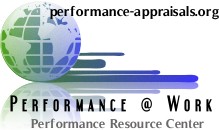What Is Rater Bias?
It's well known, from the social sciences, that when people evaluate something or someone, their evaluations reflect the thing or person being assessed, AND, the evaluator's built in biases. As human beings our judgements about many things are affected by our own perceptual googles. The effects of evaluator perceptions introduces highly subjective factors that make many evaluations more or less inaccurate.
How does this relate to performance appraisal? Bias becomes a bigger and bigger factor to the extent that the criteria for evaluation become more vague, general, and abstract. For example, if a criterion says "Sells one million dollars in homes", bias is less likely to invalidate the evaluation using that criterion, since the criterion is objective and measurable. However, if the criterion is "Sells a whoe bunch of houses", then the evaluation using this criterion is likely to be influenced by various biases, because it's much vaguer.
Rater bias is a major problem when managers rate employees using scales that are vague, or highly subjective, so if you use rating scales, it's likely that biases come into play.
Biases can work to inflate employee ratings, or to deflate them. And, the effects are largely unpredictable, since different managers will apply different biases. Sometimes the same manager will exhibit different rater biases across different employees.
Managers will do well to be aware of their possible evaluation biases, so they can try to eliminate them. And, of course, the more objective, measurable, and precise the criteria used, the less likely bias will contaminate employee ratings. However, it's true that biases are simply a built in hazard of using rating systems, and cannot be totally eliminated.
For an outline of specific biases, go back to the ranking and ratings main page.
